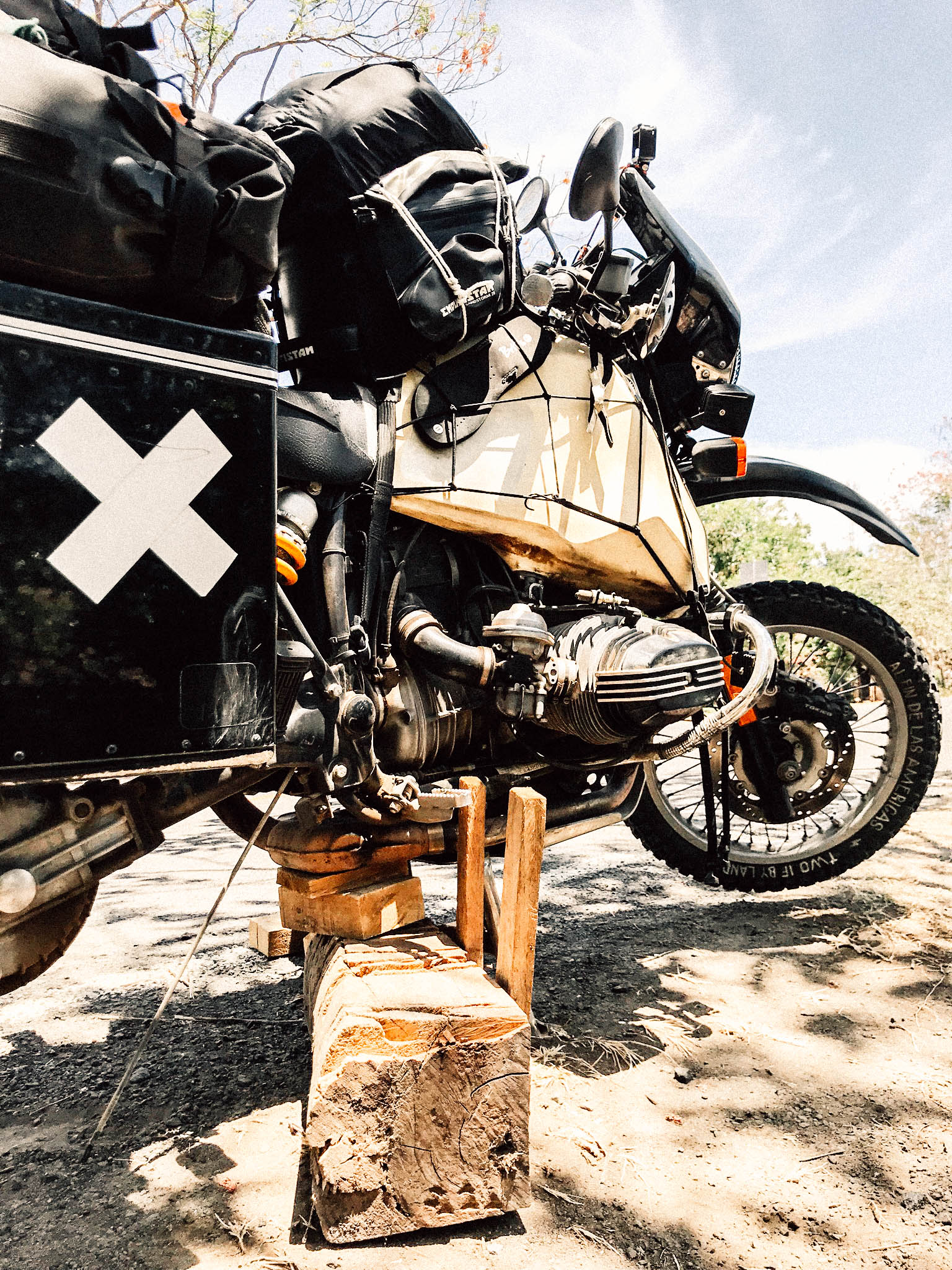There is, of course, no reverse gear on a motorcycle, so, standing off the seat, I walked the bike backwards, awkwardly and with substantial effort, twenty yards up the road into the shade of a tree. As is typical in Nicaragua, and every other country south of the United States, there was no paved shoulder, but the ground was relatively level and I was able to move the bike out of the way of traffic to safely remove the rear wheel. I had another flat tire. The cause was unclear, but no sooner had we bounced over the tope fifty yards back than I felt the unmistakable sad slushy wobble of a deflated rear tire.
An old man watched us blankly from behind a tumbling pile of scrap wood across the street. He didn’t strike me as hostile but there was nothing notably friendly about his behavior. I didn’t know what kind of village we found ourselves stranded in. Nonetheless it comforted me that he was old and when by way of gestures he vaguely offered some wood from the overflowing stack in his yard to help prop up the bike, I eagerly accepted his modest kindness. Hesitantly he eventually joined us in trying to prop up the bike. There was a slight incline in the road, and that, together with our heavy luggage was making it nearly impossible to get the weight off the rear tire. Once we removed the luggage and with his assistance we accomplished the task. Still without revealing an emotion in his face, he offered us, in the blunt, blurred speech of, as Diana observed, one more accustomed to yelling in fields over the roar and rhythm of failing farm equipment than to conversation, he offered to get us plastic chairs. Our kinship was affirmed and he left us to tend to his wood.
The tire shop that we had been assured was just down the street was closed, so I would have to either kneel on the roadside and change the tire myself or take a taxi a few miles down the road and leave Diana to watch the bike. I settled on the former. I was becoming quite confident in my tire changing skill.
Near Playa Popoyo, Nicaragua
No sooner had I wrestled the wheel to the ground than I heard a familiar voice asking if everything was alright. Looking up I recognized standing over me, smiling, the Californian couple I met in Antigua who were traveling overland in a lifted diesel Ford Econoline with their young daughter. I was shocked to find then here, three countries down the road, on what seemed to me to be a random road. I assured them that we had everything under control but that it was good to see them and thanks for stopping. No sooner had they departed, there materialized two young Nicaraguan men. One spoke English and had the unmistakable markings of a surfer. He kindly offered assistance and suggested a shop just a few miles up the road. I again thanked him for his kindness and assured him that I would be ok. He began to walk away down the road, beckoning half-heartedly to his friend who, I turned and discovered, was staring at me with dark unblinking eyes and speaking rapidly in a voice only just above audible. ‘Cómo?’ I asked, ‘Lo siento. No entiendo.’ But he, continued, apparently not hearing or understanding me either. I turned to Diana, and her superior grasp of the language, for help. ‘He says that celestial creatures gave you a flat.’ Oh good, I thought. I turned back to his companion who was still walking and was now a good distance away. He had given up his companion, ‘He won’t stop talking!’ He yelled back down the road. I set about removing the tire, ignoring the rambling lunatic hovering over me.
As the minutes passed I realized that everyone seemed to know him. Men waved as they road by on bicycles, schoolchildren giggled when they looked at him. Twin boys approached, wearing the same stoic expressionless face that the old man greeted us with earlier that gave no indication to intent or predilection. I made up in my mind that they, like most boys, were curious and harmless in spite of them coming armed with an eighteen inch long machete and a slingshot. Everyone in this country carries a machete, I told myself, for opening coconuts. And when he handed the machete to the lunatic, I decided that the best course of action was to pretend that nothing could be more normal.
I focused my eyes on the arduous task of peeling firm rubber over aluminum railing, worming my fingers inside to find a grasp on the flaccid inner tube slick with talc and grease, to peel it from its protective husk, and hold it to the examining light of the sun like a specimen of shed snake skin, to poke it, pull it, scratch it until it revealed its secret, the cause of its recent demise. I discovered a small hole, two inches from the valve, but no smoking gun, no pariah roofing nail, no rogue thorn, no abandoned barb. I ran my fingers inside the edges of the tire, the reptilian underbelly of the Metzeler brand Sahara dual sport tire of which I have grown fond, caressing every surface until my hands were glittery gray like powdered pencil lead and found nothing.
All this time his eyes, Douglas’s eyes, for that was his name, were glued on me and now he gestured with his dirty hands—hands with overgrown nails darkened like serpentine—the shape of a gun, unmistakably that of a gun. And did he still have the machete? No I think not. A chainsaw was roaring across the street, cutting new wood scraps perhaps for the sculpture of destruction enveloping the dirt lawn, that would soon obliterate from view the sheet metal shack.
His lips moved rapidly but I could not hear him, I did not desire to. ‘Como?! No entiendo!! Muchas... cómo se dice... noise!!’ Nothing could be more banal, less demanding of my attention. I turned to the boys and addressed them over the racket ‘Cuantos años tienen?!’ I thought perhaps their lips moved in response but I could not be certain. They stared blankly. Hostilely? Surely not. I decided they must have said ‘doce’. Twelve, that must be right. ‘Doce?!’ I thought perhaps one nodded slightly. Distrustingly? Just shyly. It is natural, the way their lips turn up that way, for a twelve year old boy, like they have caught a smell of something rotten on their dinner plate. They probably find me amusing, stranded here where no one stops, hastily changing a tire under the heated gaze of this sentinel of unsound mind. Maybe it would be rude to laugh.
Some schoolchildren giggled at Douglas and he put his gun away. That is, his gun became nothing more than an unwashed hand again. What would the celestial beings think? I pulled my spare tube out from my pannier, flat, firm and folded into a square, nothing at all resembling a tire. Perhaps Douglas thought me mad for attempting to repair my flat tire with this cube. But I couldn’t understand him and anyway I had long since stopped trying. In record time, I got the tube in the tire, and the valve stem though the hole, and the tire on the rim, and the air in the tube, and the bead in the bead track. The celestial beings guided my hands, strengthened my grip, focused my mind.
The wheel was on and the nuts tightened. The bags were gathered and strapped down. The eyes of the sentinel were ever watchful. The chainsaw across the street was silent. I knew the old man was peering over the piled pieces of wood to see how the show ended.
I was almost done, almost ready to escape this strange hell but my calm facade was cracking. I dared not look around and give away my suspicions. Does Douglas have the machete again? Where is the chainsaw? Where are my keys? Do we have everything? And what’s this outstretched before me? My sandals? One of the twins handed me my sandals, forgotten in the grass. This simple choice, to return these useful possessions, which could just as easily have remained lost in the grass and 'discovered' only after we had left, affirmed my suspicions. They liked me. They really liked me.
Diana handed each of them one of our stickers and while they were distracted we rode off, praying that the celestial angels would carry us away.


